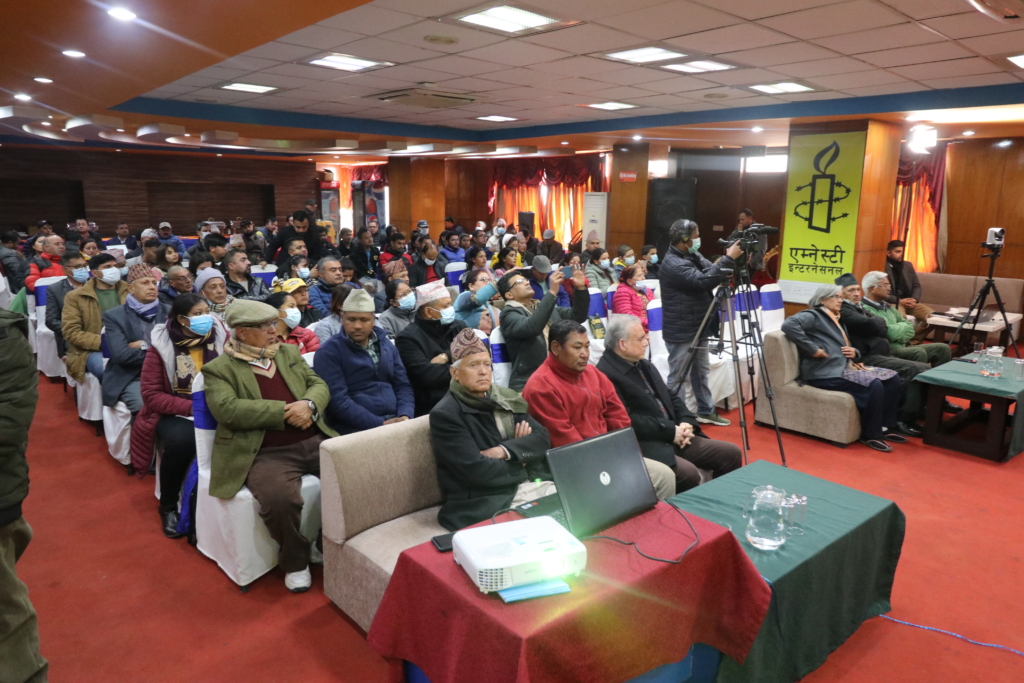
On 17 January 2023, Shree Muktinath Adhikari Memorial Foundation and Amnesty International Nepal jointly organised a memorial program in Kathmandu to commemorate the 21st anniversary of the brutal killing of late Muktinath Adhikari, the then principal of Panini Sanskrit School in Duradanda, Lamnjung who was also serving as the coordinator of a local group of Amnesty International Nepal in Lamjung.

Around 180 people attended the memorial program, including family members of late Muktinath Adhikari, relatives, human rights activists, newly elected members of the House of Representatives and Provincial Assembly, journalists, and members of civil society. The event was also broadcast live through the Facebook page of Amnesty International Nepal and can be viewed here.
Suman Adhikari, the eldest son of late Muktinath Adhikari and the founding chair of Conflict Victims’ Common Platform (CVCP), welcomed the attendees giving a brief overview of the program. He expressed deep resentment over the failure of the State and the political leaders to deliver truth and justice, even after 21 years since the incident.
In the program, homages were paid to late Adhikari in memory of his social service and human rights activism. A short video depicting the site of the horrific incident, and the long and drawn out struggle by the family towards their quest for justice was also displayed.

After the memorial program, an interactive session entitled “Long Overlooked Right to Truth, Justice and Reparations of the Conflict Victims: the Role and Responsibility of the New Parliament” was held. In the session, members of the House of Representatives Hon. Raghuji Panta and Hon. Maina Karki expressed their views on how the transitional justice has remained stalled in Nepal. Hon. Panta reminded that given the nature of political equation and the vested-interest of the top leaders, it’s unlikely that there would be any meaningful progress on the victims’ right to truth and jutice any time soon. He advised that the right course of action for the victims and civil society would be to continue to keep alive the flame of struggle, including through the street movement and mobilisation of mass media, and generating pressure from the international community.
Anita Gyawali and Ram Kumar Bhandari called out the State for its failure to deliver on its promise of truth, justice, and reparations for victims of the decade-long conflict.
Likewise, Senior journalists Purushottam Dahal and Kanak Mani Dixit stressed on the urgent need for resolving TJ issues in Nepal, while senior activists Charan Prasai and Susan Risal called for a speedy resolution of the unfinished agenda of truth, justice, and reparations.
Manchala Jha, former Commissioner of the Truth and Reconciliation Commission, stated that flaws in transitional justice laws and the lack of political will remain as major impediments to moving forward and resolving the issue for the Commission. Former State Minister Ram Chandra Adhikari questioned the Commissions’ ability to deliver justice, claiming that the Commissioners who went on to serve in the Commissions served as the puppets to those who appointed them rather than as an accountable officials.

Amnesty Nepal Chair Bipin Budhathoki expressed his belief that the government will prioritise the agenda of transitional justice, in particular, the reintroduction of the TJ bill that was tabled in the outgoing parliament by the previous government, retaining some of its good provisions and addressing the serious flaws as pointed out by the victims and civil society groups. Budhathoki also expressed the urgency of the need to transfer the agenda of truth and justice to the younger generation in order not to let the issues go into oblivion.

The chairperson of the Nepal Bar Association, Gopal Krishna Ghimire, is committed towards extending Nepal Bar’s assistance in any way possible for the cause of TJ. Secretary of the National Human Rights Commission (NHRC) Murari Prasad Kharel expressed that NHRC’s stance had always been that the violators of human rights should not be left outside the ambit of justice. He stated that the provision of partial reparation to the victims and denial of justice cannot be accepted and expressed the commitment that any act done by the government or political leadership that is against the international norms regarding TJ will be pointed out and condemned by the NHRC.

Honourable Maina Karki, MP and former Chair of the Conflict Victim Common Platform, stated that as a conflict victim herself, she would devote all her efforts towards amending the flawed TJ laws.
Member of Gandaki Province Legislative Assembly Hon. Dilli Ram Subedi expressed his commitment to work with the conflict victims and work as per their suggestions on how the Province Legislative Assembly can work on this issue by using the powers common to the Province and the Centre under the Constitution of Nepal.
Towards the end, poems in memory of Late Adhikari were recited by his granddaughter and his colleague Naranath Adhikari, the chairperson of Shree Muktinath Adhikari Memorial Foundation expressed gratitude towards all the participants for their cordial presence and concluded the program.

